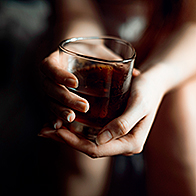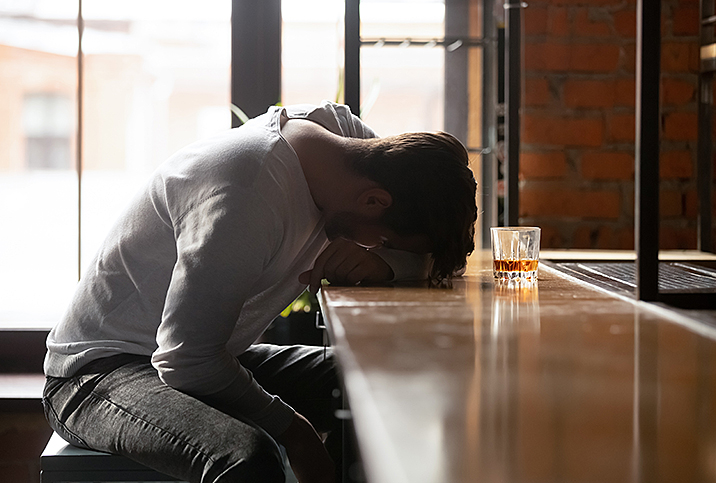Sober Sex: Your Sex Life Without Alcohol

Alcohol use disorder (AUD) is a medical condition that impacts millions of people's lives in communities worldwide. Recovery can be challenging and take a long time for the most dedicated, but achieving it with the right tools and support is possible.
Find out how AUD and recovery impact your relationships and sex life and learn about sober dating. Discover how "dry dating" can be just as much fun and more.
What is alcohol use disorder?
Alcohol use disorder is defined by the National Institute on Alcohol Abuse and Alcoholism as "a medical condition characterized by an impaired ability to stop or control alcohol use despite adverse social, occupational or health consequences."
This condition, which exists on a spectrum and can vary from mild to severe, is a prevalent brain disorder. In 2021, the National Survey on Drug Use and Health estimated as many as 28.6 million people in the United States, 18 years old and older, had alcohol use disorder.
Research indicates a number of risk factors can contribute to AUD, such as:
- A family history of alcohol use
- A history of trauma
- Genetics
- Preexisting mental health conditions
- The availability of alcohol
If you suspect you are living with AUD, a healthcare professional can use the definitions provided in the Diagnostic and Statistical Manual of Mental Disorders, Fifth Edition (DSM-5) to assess your symptoms.
Alcohol can have a significant impact on a person's physical, mental and emotional state.
This process starts by having you reflect on how often in the past year you experienced a range of symptoms. According to Mayo Clinic, those symptoms can include:
- Being unable to focus on anything but drinking
- Continuing to drink even though it's causing problems with your life, relationships and career
- Dedicating time and energy to getting or drinking alcohol
- Engaging in unsafe behaviors, like binge drinking
On its own, alcohol use disorder is a serious medical condition that can affect your mental and physical health. Left untreated, it could impact your relationships and sexual health.
AUD and your sex life
Everyone responds to and is impacted by alcohol consumption differently, and studies suggest AUD can affect sexual function and pleasure in a variety of ways. Three major sexual health symptoms exhibited when you consume too much alcohol include erectile difficulties, vaginal dryness, and arousal and orgasm problems.
Difficulty getting or maintaining an erection
Alcohol consumption can lead to erectile dysfunction (ED), which is defined by John Hopkins Medicine as the persistent inability to achieve or maintain penile erection sufficient for satisfactory sexual performance.
There is "a significant relationship between regular alcohol consumption and ED," according to a September 2021 review of 46 studies with more than 200,000 participants.
Vaginal dryness
Alcohol consumption can dehydrate the body and regular consumption can lead to vaginal dryness. A 2023 study published in BMC Women's Health suggested vaginal dryness is one of the primary causes of discomfort during sex, making sexual activity less pleasurable for women.
Difficulty becoming aroused, achieving orgasm
Alcohol can have a significant impact on a person's physical, mental and emotional state. Chronic consumption of alcohol can impact hormones, such as testosterone levels, which can lead to issues such as ED and vaginal dryness and make it more difficult for women and men to achieve orgasm.
When did you last have sober sex?
In addition to the physical effects, people with AUD may associate alcohol with intimacy.
Do sexual activity and intimacy typically happen under the influence of alcohol? Can you not recall the last time you had sober sex? Answer 'yes' to both of those questions and there's a good chance that there's a problem, according to Edward Ratush, M.D., a board-certified psychiatrist in New York City and a co-founder of SOHOMD, a national teletherapy and telepsychiatry platform for integrative and personalized mental health care.
He explained people may struggle to process difficult emotions, such as shame or guilt, which they associate with sexual experiences they had prior to recovery. Those past experiences and accompanying emotions can impact current sexual relationships and how you're processing what's happening to you now.
The good news is people with AUD can achieve and maintain recovery through a combination of evidence-based treatments, such as behavioral therapies, mutual-support groups and some medications.
Once you've found a partner, it's important you establish boundaries about what is appropriate for a date.
While fear of stigma can be difficult to overcome, the sooner you start receiving treatment and begin recovery, the better, according to Pierce Biglefthand, L.C.S.W., a licensed addiction counselor in Great Falls, Montana.
"People who begin treatment can start to experience changes in their sexual function and pleasure as their bodies adjust to sobriety," he said. "You may not have to wait long to see the improvements."
A 2022 study published in the Journal of Sexual Medicine indicated about 89 percent of participants experienced improvements in their ED after three months of sobriety. It may take time, but recovery is possible.
Relationships, recovery and sober dating
Recovery can be a difficult process, and a part of the process includes reestablishing intimacy in existing relationships that were compromised due to AUD. Thankfully, experts say it is possible to do this with your loved ones.
Biglefthand noted partners deserve to have their needs met and reestablishing intimacy can be achieved by giving you and your partner time to heal.
"It can also be done by taking small steps to rebuild trust, such as doing one special or meaningful thing for each other every day," he said. "Partners may also benefit from couples therapy because it can provide a safe space to express emotions and work through any underlying issues."
If you're sober, single and ready to mingle, consider a few important things.
Many programs, such as Alcoholics Anonymous, discourage dating during the early stages of recovery. As you progress further along on your journey, though, and begin to feel comfortable getting back out there, what can you expect?
You may well have to reconsider what finding a partner and going on a date looks like for you.
If you typically found your partners through apps, you may have to reconsider what apps you're using or how you are using them. One option is Loosid, a free sober dating app that connects thousands of people in the sober community with one another and with resources that aid recovery.
Bumble recently launched its Sober Badge feature, which allows users to share they are sober with their potential matches.
Finding the app that works best for you among the many options will make sober dating that much easier.
Once you've found a partner, it's important you establish boundaries about what is appropriate for a date. Are you willing to go to a venue that serves alcohol? If not, consider venues and activities that do not involve alcohol. Maybe a trip to the botanical gardens, visiting a bookstore or exploring a local farmer's market.
If you're comfortable with venues that serve alcohol, are you comfortable with your date drinking around you?
Ask yourself these questions and more, and be honest with yourself. Clear communication with potential dates will help ensure both of you have a safe and enjoyable time.
Getting help for AUD
Alcohol use disorder is a serious medical condition, which impacts millions of American adults. Recognizing the problem is a good first step. Through a combination of medical treatments, effective therapies and community support, people can enjoy healthy relationships, fun dating lives and satisfying sexual experiences.
If you or someone you know is living with severe AUD, you may need additional medical treatment to prevent alcohol withdrawal, which can be life-threatening.
Learning about AUD is important. Consider visiting some helpful websites:
- Alcoholics Anonymous
- AI-Anon and AIateen
- Centerstone
- Daybreak (phone app)
- LifeRing Secular Recovery
- Secular Organizations for Sobriety
- SMART Recovery
- Sober Grid (phone app)
- Soberistas
- Women for Sobriety
Alcohol use disorder affects about 30 million adults in the U.S., affecting mental and physical health. Aside from impairing factors in your life, AUD will also affect sexual function and your ability to experience pleasure from sex. That’s a good incentive to consider making your next date one without alcohol.
In consultation with your doctor, and the help and support of friends and family, there’s a lot you can do to begin transitioning to sober dating. And today is a great day to start.




















